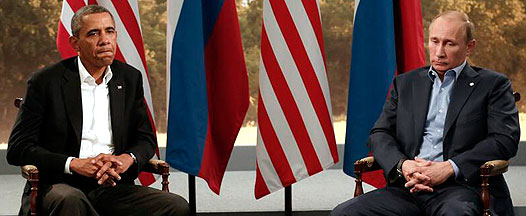The Russians claim that they had to grant NSA leaker Edward Snowden asylum or President Vladimir Putin would look weak. But Moscow seems more than happy to contribute to President Obama’s air of impotence.
Videos by Rare
On Thursday, the Russian Federation granted Edward Snowden a year’s asylum, releasing him from five weeks of de facto captivity in Moscow’s Sheremetyevo airport. Russian authorities have consistently downplayed the Snowden affair, and Moscow seems convinced that granting asylum was a cost-free move. “We are aware of the atmosphere being created in the U.S. over Snowden,” Russian presidential aide Yuri Ushakov said, “but we didn’t get any signals [indicating a possible cancellation of an upcoming summit meeting] from American authorities.”
White House Press Secretary Jay Carney countered that the administration is “extremely disappointed” by the asylum offer and “evaluating the utility of the summit.” You can hardly blame the Russians for misreading the diplomatic tea leaves. The Obama administration was downplaying Snowden’s importance since he landed in Moscow more than five weeks ago. Last month Mr. Carney described attempts to have Snowden extradited as “something that routinely is dealt with between law enforcement officials in various countries and this is not exceptional from a legal perspective.” See, strictly routine, nothing to get worked up about.
After Russia granted Snowden asylum, the White House stuck to the line that this was a failure of legal protocols, not a diplomatic bitch-slap. “This move by the Russian government undermines a longstanding record of law enforcement cooperation,” Mr. Carney said, “a cooperation that has been on the upswing since the Boston Marathon bombings.” (If only it had been on the upswing before the Boston Marathon bombings, when U.S. officials were ignoring Russia’s warnings about the Tsarnaev brothers.) Mr. Carney also repeated the administration position that Snowden is “not a whistleblower,” which is kind of like saying Egypt did not have a coup; no-one believes it but it keeps the lawyers happy.
Mr. Obama has made it abundantly clear that he does not believe that l’affaire Snowden rises to his pay grade. In June he snapped at reporters who asked if he had spoken to China’s President Xi Jinping or Russian President Vladimir Putin about the issue, claiming he “shouldn’t have to.” He said that the United States has “a whole lot of business that we do with China and Russia,” and that he was “not going to have one case of a suspect who we’re trying to extradite suddenly being elevated to the point where I’ve got to start doing wheeling and dealing and trading on a whole host of other issues.” He sneered that he’s “not going to be scrambling jets to get a 29-year-old hacker,” which only proved to the world that he’s no Ronald Reagan.
Mr. Obama says he can’t elevate the Snowden affair in his diplomatic dealings because he has “a whole lot of business” to do with Russia. OK, like what? What is so important that he cannot take a strong stand on an issue that the whole world is watching? Mr. Obama may well consider Snowden a flaky slacker, but he is a hero to much of the world, and his flight from justice is a global cause célèbre. From the perspective of the global community being targeted by the NSA, Moscow is seizing the moral high ground. Mr. Obama’s lack of response makes him look weaker by the day, and his studied indifference to the case only magnifies his impotence. He claims he “shouldn’t have to” get involved in resolving the situation, but there is a growing belief that the real reason he isn’t trying to resolve it is because he can’t.
The “wheeling and dealing and trading” that Mr. Obama thinks is beneath him might better be called the hard work of diplomacy. It is unclear how Mr. Obama thinks international agreements get worked out. Perhaps he believes that diplomacy is an orderly process of well-intentioned parties seeking fair agreements for mutual benefit. This scholarly approach might explain why his administration’s foreign policy is such a disaster. Mr. Obama is reportedly pursuing a “hidden hand” approach to foreign policy in his second term, the apparent successor to “leading from behind.” But the hand is well hidden, and positive results virtually invisible. Maybe he would be more effective if he got his hidden hands dirty once in awhile.
James S. Robbins is Deputy Editor of Rare and author of Native Americans: Patriotism, Exceptionalism, and the New American Identity. Follow him on Twitter @James_Robbins



